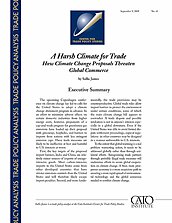The upcoming Copenhagen conference on climate change has led to calls for the United States to adopt a climate change abatement program in advance. In an effort to minimize adverse effects on certain domestic industries from higher energy costs, however, proponents of a cap-and-trade program for greenhouse gas emissions have loaded up their proposal with giveaways, loopholes, and barriers to imports from nations with less stringent emission caps. These trade measures are likely to be ineffective at best and harmful to U.S. interests at worst.
First, the key targets of the proposed import barriers, India and China, are relatively minor sources of imports of energy-intensive goods. Most carbon-intensive imports to the United States come from other developed countries that have stricter emissions controls than the United States and will therefore likely escape import penalties. Second, and more fundamentally, the trade provisions may be counterproductive. Global trade rules allow import barriers to protect the environment under certain conditions, some of which the main climate change bill appears to contradict. A trade dispute and possible retaliation is not in anyone’s interest, especially in a global downturn. Even if the United States was able to avoid formal dispute settlement proceedings, copycat regulations in other countries may be designed in a manner unfavorable to U.S. interests.
To the extent that global warming is a real problem warranting action, it needs to be addressed globally rather than through unilateral efforts. Antagonizing trade partners through probably illegal trade measures will undermine efforts to secure global cooperation on climate change. A freer, more prosperous economy is a more auspicious path to ensuring a more rapid spread of environmental technology and the global consensus needed to combat climate change.

This work is licensed under a Creative Commons Attribution-NonCommercial-ShareAlike 4.0 International License.

